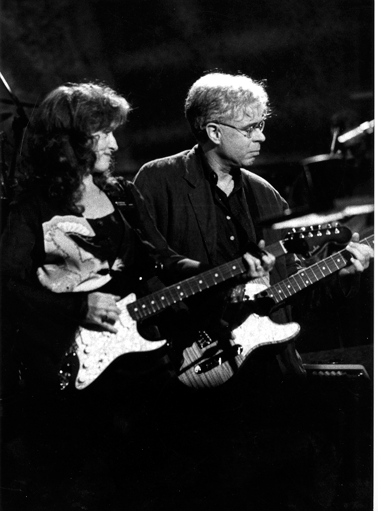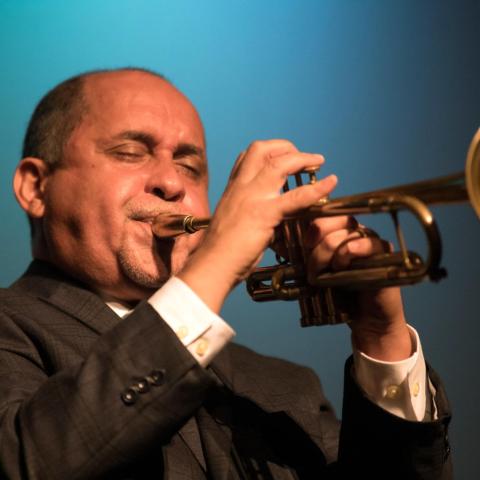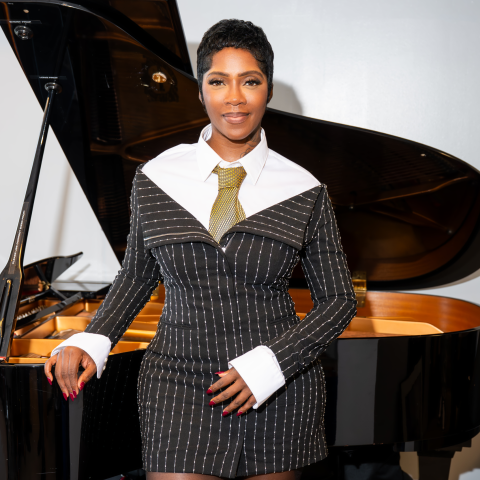Living in the Present Tense with Bruce Cockburn
Not surprisingly, Bruce Cockburn ’65, one of Canada’s most revered singer/songwriters, is also one of the busiest musicians north of the border. On the heels of a few years of hard touring, Cockburn decided to lay back a little bit during the year 2001, but he ended up being straight out anyway, even without a major tour. In addition to moving, making a smattering of concert appearances, writing and recording a project with New York jazz pianist Andy Milne, and being inducted into the Canadian Music Hall of Fame, he had TV producer Robert Lang and a camera crew following him around over several months collecting footage for a one-hour documentary about him.

Bonnie Raitt jams with Cockburn onstage at a concert in Los Angeles. Raitt also performed on Cockburn’s 1996 The Charity of Night CD.
The Canadian Broadcasting Corporation aired the film, The Life & Times of Bruce Cockburn, nationally last fall. It punctuated a year that presented Cockburn with some outward reminders of his contributions to the music world and his staying power in what many experience to be a fickle industry.
Since the release of his self-titled debut album in 1970, Cockburn has seen 20 of his albums achieve gold or platinum status. He has also netted 11 Juno Awards—the Canadian equivalent of the Grammy Award—and a host of other music and nonmusic awards. Recognizing his gift with lyrics, two Canadian universities, York and St. Thomas, have bestowed honorary doctor of letters awards on Cockburn. In 1997, Berklee awarded him an honorary doctor of music degree.
Among the most obviously appealing features of Cockburn’s music are his powerfully resonant tenor voice and his agile acoustic and electric guitar playing. Throughout his catalog of 26 albums, he has woven strands of folk, rock, blues, jazz, and world music together to fashion a sonic tapestry that is uniquely his own. Any Cockburn fan, however, will tell you that the lyrics are the heart of his art. For the past three decades, Cockburn has been sharing with millions of listeners his personal reflections on the human condition in song. He treats love, environmental concerns, human rights, landmines in Mozambique, his deep spiritual feelings, and a range of other topics with all of the finesse and passion of the best bards in the business.
Some artists, after turning 50 and reaching the lofty career heights he has seen, start to look back nostalgically, but that kind of sentiment is not for Cockburn. With his recent induction into the Canadian Music Hall of Fame, the Life & Times documentary film, and his latest CD Anything Anytime Anywhere (a retrospective of his work since 1979), it would seem that everyone but Cockburn is looking back.
I reached him by phone at his hotel in Boulder, Colorado, the day that he taped the E-Town 10th anniversary show with Lyle Lovett and the gospel group the Fairfield Four. While he spoke warmly of his youth in Ottawa, his Berklee days, and how his career got started, he was eager to note that his new CD of old songs opens and closes with brand new ones, and that he plans to record a new CD this spring. Cockburn is very centered in the present and told me that even he is anxious to see what he is going to do next.
Was there an early musical experience that you can remember that ignited your passion for music?
I think hearing Elvis and Buddy Holly for the first time gave me a desire to do this. I was 12 then, and at around 14 I started to play the guitar. I had been introduced to music before that but it wasn’t until rock-and-roll came along and I got the idea to play the guitar that there was anything like passion involved. At that age, you don’t have any idea what you are going to do with it. I wasn’t sitting there saying, “I think I’ll become a professional musician now.”
Did you start writing your own songs from the beginning?
No, but I took guitar lessons immediately. At that time—about 1959—guitar playing was associated with rock-and-roll, which was associated with gangs, leather jackets, long sideburns, and switchblades. My parents bought into these associations, so they were nervous about me playing the guitar. They said they would support it if I promised to take lessons and learn to do it properly and if I promised that I wouldn’t get a leather jacket and grow sideburns. It was easy to make those promises, so I started taking lessons.
Was your first guitar an acoustic?
No, it was Kay archtop with a DeArmond pickup on it. Acoustic guitar meant nothing to me in those days. It was the presence of folk music on the cultural landscape that pointed me to acoustic guitar. In the latter years of high school, I fell in with a bunch of folkies who taught me about fingerpicking and a wealth of music that I had never encountered before. At that stage I was listening to rock-and-roll and jazz but had not encountered many other types of music. I heard Brownie McGhee and Sonny Terry play live, and it was mind-blowing to hear the energy and depth in their music. They were the first blues guys I listened to.
What drew you to Berklee in the 1960s?
A lot of changes happened in a short time so that, at 17, I was listening to a lot of jazz. I was interested in composing for jazz orchestra. I had a book by Bill Russo called Composing for the Jazz Orchestra. That was one of the credentials that I could offer when I applied to Berklee. My dad and I sat in [late Berklee administrator] Bob Share’s office for a meeting to see if I was a suitable candidate for Berklee. Bob said that if I had worked my way through that book, I would do okay.
At the time, I had no aspirations to be a songwriter. I was interested in writing for jazz orchestra. I was trying to write poetry and trying to make music, but I didn’t think of putting the two together until after I left Berklee. I think I had written a couple of songs in my last semester.
Did you have any pivotal experiences at Berklee?
There was a tremendous positive influence from being so steeped in music. At that time, the jazz guys were starting to explore the music of other cultures. There were people experimenting with Arabic scales. That was exciting to me because it felt fresh. The school was on Newbury Street then. You’d walk up and down the alleys in the Back Bay, and from the apartment windows you’d hear people practicing. It was so rich and had a huge effect on me that hasn’t gone away. Also, the Jazz Workshop [legendary jazz club] was around the corner, and I got to hear John Coltrane, Roland Kirk, and a host of people who were incredible players. The technical things that I learned at Berklee have not been a big part of what I do, but the process of learning them put me on a good track.
What did you do after leaving Berklee?
I joined a rock band back in Ottawa that was doing original material. That’s when I started to think of myself as someone who wrote songs. For the rest of the ’60s I was in several bands and was writing songs for them. By the end of the sixties, out of the many songs I’d written, I had a couple dozen that really worked for me. They sounded better when I sang them alone than with the bands. I decided to go solo with just an acoustic guitar, figuring that there would be an audience for that kind of music. I recorded an album at the end of 1969 for the True North label, and it came out in 1970.
Isn’t True North the only label that you have worked with?
Yes. Of course, we have had distribution deals with various labels in the States. When the first album came out, FM radio was new and very free-form. They would play whole albums on the air. A station in Toronto got my album and played it all. That was the beginning. It took a while to get the music spread around the whole country but by the end of the ’70s it had happened.
It has been fortuitous for you to have wide distribution and yet be on a small label so that you can maintain creative control over what you are doing.
That was by design, but was lucky, also, because I was ignorant about how the business worked. I wanted to put these songs down on record the way that I played them. I was considering getting a classical producer or someone who would just make it sound good and not mess with the songs. A friend of mine, Eugene Martynec, ended up producing it. He knew Bernie Finkelstein, who owned True North Records, and brought him into the process. We recorded it in three days for about $6,000. After it came out, people got into it, and that was the beginning of my being able to travel around and perform the songs on a broader scale.
Who determines which songs will go on your albums, and has there always a producer or coproducer involved?
It varies. I produced the last few albums with coproduction help from Colin Linden. Before that, T-Bone Burnett produced two, and before that I worked with Canadian producers Jonathan Goldsmith and Eugene Martynec. The executive decision about what goes on the album is exclusively mine. I listen to other people’s opinions though.
That’s a unique situation. It’s much different for artists on a major label.
I’d be very wary of signing with a major label. When True North made a distribution deal with Columbia in the States in the ’90s, I was nervous because I thought they could swallow us up so easily. We built safeguards into that deal and dealt with the company in a very human fashion, and it worked out very well. I have seen some of my friends get caught in a bind by recording an album that the label doesn’t like. Then the songs are tied up, so they can’t go record them somewhere else and put them out. Some artists are seduced by the tour support and the advances that a big label can offer. But if their record is not a hit, they end up owing the rest of their lives to a bunch of bureaucrats. I feel lucky to have avoided that.
The fact that Bernie Finkelstein, your manager, is also the owner of your record label seems to have worked out very well.
He has allowed me to stand at arm’s-length from the rest of the music business. I’m grateful for that. I wouldn’t have done it any other way. When I started out, it was a different era and the vibe was different. I don’t know what decision I would have to make if I were doing it now. At that time, it seemed that for me to have total control was the only way that it was worth doing.
Does the inspiration for your songs come from a guitar lick, a melody, or a lyric?
It virtually always starts with lyrics. I will get musical ideas from sitting around and playing the guitar. Occasionally these ideas jell into an instrumental piece, but most often they sit there on file until there is some lyric to hang them on. The lyric side of it involves a lot of waiting for the inspiration to hit. Once there is something resembling a set of lyrics, I start looking for music that will carry it. I have compared the process to scoring a film, because the lyrics are so big a part of the song for me. You have these images, ideas, and sometimes characters that need to be sup- ported by the music but not dominated by it. So I see it more like scoring a film than some songwriters do.
You are very adept at creating a scenario in your lyrics, giving enough information to bring the listener into a time, place, or situation, but keeping a lot of the personal meaning of the song hidden. That leaves a lot of room for interpretation of your songs.
I think people are going to interpret a song no matter how specific you make it. They will read their own things into it. The [Beatles] song “Helter Skelter” is perhaps the most horrible example of that. An important part of the exchange that happens between the listeners and me through the song is the stimulation of their imaginations. They can then bring their own experience into the song. The basic motive for me is to sound off and tell everybody how I feel. We all experience the basic elements of life, so it is often just a matter of presenting a different angle on something familiar. Each of us has the ability to offer that to each other. All of our experiences are our own even though the birth-death-infinity thing is the same for each of us. The songs are a vehicle for me to share the human experience. I don’t like to impose too many preconceptions on what that is.
Are you typically revealing your own experiences in songs like “Pacing the Cage” or “Last Night of the World,” or are you commenting on an issue through a character? Do you take both approaches?
Most often it is my experiences that I talk about in the songs. There are a few exceptions. The song “A Dream Like Mine” is more a character song. I was imagining myself as a native person. That is rare though. Generally, I am making lists of what I am looking at in my songs.
Has your attitude about being a spokesman through your songs changed after writing for and reaching a large audience for 30 years?
It has developed. I wasn’t really conscious of any of the implications when I started out. I had seen people get up on stage and play, and that was what I wanted to do. I fell into it. With experience, you realize that when you are onstage in front of a group of people you become larger than life. What you say has the ability to influence people in some way—to horrify them, excite them, or motivate them. It’s in that sharing that the truth comes out and the value of what an artist does comes out. It took me a long time to understand that. I don’t like to think that I have tried to influence people toward a particular end. I just want to tell them what I’ve seen and what I think about it. I just say it and they can do with it what they want. That is where I am coming from with the spiritual or so-called political stuff in my songs.
There was a period when your spiritual thoughts were very much on the surface in your music. Are spiritual matters still a big motivator for you?
Very much so. In the ’70s, it was expressed in Christian terms and was more overt. Once you have said all that, you don’t have to keep on saying the same thing. There are many ways to say that God is in your life or that you want God in your life. I don’t feel constrained to say only that.
You like to include instrumentals on your albums. You don’t often find them on a songwriter’s album.
Some nonmusicians will say, “Oh, that tune is only an instrumental. Is it that way because you couldn’t think of any words?” There is a resistance to accepting songs without voices or words among the public and radio. That is not a determining factor for me.
During the period that precedes the recording of an album when I am writing, some things come out as songs and some are instrumentals. Whatever I have when it is time to record goes on the album. “Mistress of Storms” was one of those that developed as an instrumental piece. As it was taking shape, I started hearing vibes on it. It was fun to think of it as a latent duet when I wrote it. It worked out very well in the studio with Gary Burton playing with me. I like the presence of instrumentals in what I do because it gives people a break from the density of the lyrics.
You started in a folk style and later incorporated jazz, blues, and world-music influences. It has become very difficult to put a stylistic label on what you do.
That is true, and it’s unfortunate because the music business loves to label everything; it is part of the packaging and marketing to have a name to call it by. The record-company rep goes into a station and has to give a long-winded explanation of what the musical style is instead of being able to give it a convenient label. I give everybody a hard time in that end of the business because they don’t know what to call it. Radio doesn’t know what to call it or where to fit me into their format. I have been treated very well by the triple-A stations in the States, though.
You were able to attract an audience with the help of radio before it became so formatted.
We all deal with whatever challenges are facing us. If I started out now, I’d be doing something, but it would be a very different scene than what I was confronted with when I started. Back then, it was early FM radio and coffeehouses, where there was a sophisticated listening audience that was not drinking. That really colored my perception of what the artist/audience relationship should be. I have changed my attitude from thinking that the art was sacrosanct and that everyone had to be dead-quiet. Now my attitude when I am touring with the band is: the wilder the audience the better. The intensity of a band in a small club is great.
It is always encouraging to see artists like you who have drawn the market to themselves rather than adapting to what is happening at the moment with radio.
Once you have an audience, certain expectations are in place. The audience expects that you will always do the thing they like. But, of course, some people will expect you to introduce new things. There is pressure from the business to have one song on the record that they can send to radio. To some degree, it is worth paying attention to those things so you know what is going on around you. But they should not be a determining factor; the music has to come first.
Does it work for you to write a song especially designed to get radio play?
I can’t do it. There are songwriters who do that and they are very successful. Sometimes we end up really liking those songs. I can’t think of a modern example, but a lot of songs that I feel nostalgic about from the ’60s are like Tin Pan Alley songs. They are formula songs by people like Carole King. “Up on the Roof” and “Under the Boardwalk” are perfect examples, and they were written, presumably, with a different philosophy than I have when I write. Maybe the approach by writers in Nashville is similar. They call and make an appointment for 2:00 p.m. on Thursday to write a song with someone. Some of those songs come out well. But it’s an aspect of songwriting that I have no affinity for.
Have you ever tried collaborating on songs with other writers?
Only a little bit. This year I worked with a young jazz pianist named Andy Milne. He approached me to collaborate with him on songs for his album. I was really excited about the idea. It is fun to work with somebody young and fun to expand into a medium that I haven’t done anything with in a long time. Jazz is very different now. Andy doesn’t do anything in 4/4 time; everything seems to be in 7 or 11 and it all grooves. The material consists of my lyrics and his music primarily. We came up with some interesting new songs and a reworking of one of my existing songs. It was a lot of fun.
Is there any particular style or genre of music that has really grabbed your attention these days?
I have been exploring electronica recently. I am not using it, but I am listening to a fair amount of it. I still find [trumpeter] Dave Douglas’s albums to be great; I put them on all the time. There is a host of people doing a mix of eclectic music. I suppose I lean toward the jazzier end. But, really, I listen to all kinds of stuff.
After three decades as an influential recording and performing artist, is there anything in the road ahead that is beckoning to you?
I am just waiting to see what I do next. I had a long dry spell until a few months ago before I started writing again. That dry spell seemed to culminate in me being placed in the Canadian Hall of Fame. There was a certain irony in that. First of all, being in the Hall of Fame is kind of like being a dead guy anyways and it came at a time when I hadn’t written anything in about a year. It really struck me that it was the closure of some chapter. So where do I go from here? The sensation of waiting to see what I do next is the predominant one right now.
When will you release a new album?
First there will be a so-called “greatest hits” album early in the year. Rounder Records will distribute that in the States. That will have a couple of new songs, and if all goes as planned, we’ll go into the studio in the spring to make a new album. I have songs that I know are going to be on that and some that may not make it onto the album. There will be others that I haven’t written yet.
Do you have a parting shot to give aspiring songwriter/performers out there?
Sure. It’s probably not healthy to think of it in terms of control, but placing the art first is a really important choice to make. I would encourage people to do that. Not everyone will want to or feel that they are able to do that, but the more artists we have who put the art first, the better. The ones who do are the ones that become an influence on others.




